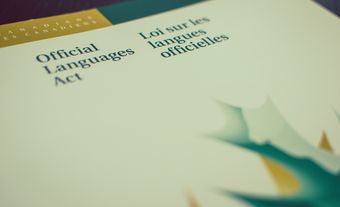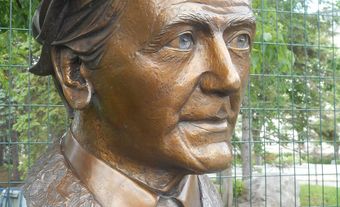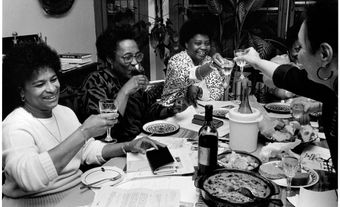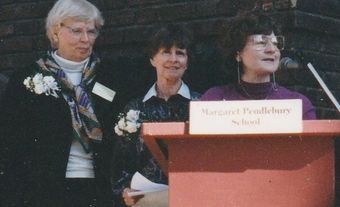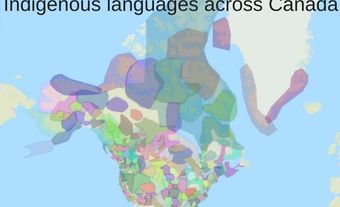Quebec is the only province in Canada where francophones make up the majority population. For almost two centuries, many have maintained that preserving the French language was the only possible safeguard for the survival of the Quebec nation (see Francophone Nationalism in Quebec). However, it wasn’t until the Quiet Revolution in the 1960s that governments in Quebec began to actively legislate on the issue. Since 1974, French has been the only official language in the province, although some government services remain accessible in English. Quebec has the distinction of being bilingual on constitutional and federal levels, while officially allowing only French in its provincial institutions.

Creation of the Office de la langue française (1961)
After the creation of the Office de la langue française (French Language Office) in 1961 by the Liberal government of Jean Lesage, who believed that "bien parler, c’est se respecter" (to speak well is to respect oneself), action in support of the quality of the French language increased. The first exchange projects between France and Quebec began in 1965. From 1966 to 1968, the Daniel Johnson, Sr government made every effort to position French as the dominant language in Quebec. French became mandatory on food-product labels, and the foundation was laid for an immigration department that required newcomers to have a working knowledge of the language (see Quebec Immigration Policy). This government was founded in 1968, a few weeks after Daniel Johnson’s death.
The first legislative bills related to language appeared under the Jean-Jacques Bertrand government. These were implemented following the 1968 education crisis, during which a large number of Italian immigrants living in Saint-Léonard demanded the right to bilingual education (in English and in French). The initial legislation (Bill 85), which allowed parents to choose their children’s language of instruction, was withdrawn and the Gendron Commission (1968–73) was formed to analyze the situation of the French language in the province.
In 1969, the Act to promote the French language in Quebec (Bill 63) was enacted. It guaranteed parents the right to choose the language of instruction for their children, with the Ministry of Education simply ensuring that children taught in English acquire "a working knowledge of French." Consequently, allophones were anglicized, and francophones united to form le Front du Québec français, which demanded that French become the only official language in Quebec.

Official Language Act (1974)
The report of the Gendron Commission, presented in February 1973 under the Robert Bourassa government, officially proposed that French become the only official language in Quebec, while French and English would both remain the national languages. As to the language of education, the decision was left to the government. Faced with increasing social unrest, it drafted Bill 22 (the Official Language Act) in 1974 to compensate for the shortcomings of Bill 63.
Bill 22 made French the language of provincial government administration, services and labour, but its application remained vague: the Liberals, wishing to preserve biculturalism, had left room for ambiguity. The wording stated that French must be the language of education, and that anglophones wanting schooling in English would have to prove through testing that it was indeed their mother tongue. This caused widespread dissatisfaction: francophones judged the program too moderate; anglophones and cultural communities felt unjustified in submitting to an examination in order to study in English. The issue of commercial signs in French was also broached, but no clear formal requirement was drawn up. The disfavour of the two camps had direct repercussions on the 1976 provincial election, which brought the Parti Québécois to power for the first time.

Charte de la langue française (1977)
The René Lévesque government made the language issue its priority and enacted Bill 101, the Charte de la langue française (Charter of the French Language), in 1977. The objective behind the charter was to allow francophone Quebecers to live and assert themselves in French. This bill followed the publication of a controversial white paper (Bill 1) the same year. Camille Laurin, the “father of Bill 101,” made it a very specific law endowing Quebec with institutions like the Conseil de la langue française and the Commission de surveillance (which became the Commission de protection de la langue française in 1984). Bill 101 stipulates that French must be the language of legislation and the courts, administration, work, and business as well as education.
Challenges to Bill 101
Although a significant number of Quebecers were very pleased with the clarity and resolve of these new measures, there was no general agreement, and the law was considered in part unconstitutional by the federal government. The Supreme Court of Canada dealt the legislation a hard blow in the case of Attorney General of Québec v. Blaikie (13 December 1979) by confirming a judgment of the Quebec Superior Court that struck down Sections 7 to 13 of the Charter of the French Language — provisions that declared French the language of legislation and the courts. As a result, Quebec adopted “remedial legislation” in the form of the Act respecting a judgment rendered in the Supreme Court of Canada on 13 December 1979 on the language of the legislature and the courts in Québec to accommodate this court decision.
Quebec also amended a clause in Chapter VIII of Bill 101 on the language of teaching. The “Quebec” clause was deemed too restrictive because it stipulated that immigrants had to study in French. This included Canadians from other provinces, unless there was an agreement between Quebec and the province of origin. This clause was replaced by the “Canada” clause, allowing children who had attended an English-speaking school in another province to continue their studies in English (see Bill 101 Case).
In the Ford case in December 1988, the Supreme Court ruled on sections 58 and 69 of the Charter of the French Language, which required the exclusive use of French on commercial signs and in firm names. The Supreme Court judged that those sections violated freedom of expression as set out in the Canadian Charter of Rights and Freedoms and the Quebec Charter of Human Rights and Freedoms. On 22 December 1988, the newly reinstated Bourassa Liberals voted in Bill 178. This law required signs to be in French, except for some cases, depending on business size and number of employees, where both languages would be allowed on condition that French predominate. The dissatisfaction was palpable: anglophones felt betrayed and francophones feared the return of bilingualism. On 17 June 1993, Bill 178 was replaced by Bill 86, which reaffirmed the principle of bilingual signage with precedence given to French in public places.
In the spring of 2000, following various demonstrations by antique dealers in the Eastern Townships, the issue of signage was once again brought before the Supreme Court. Advocates for both sides could not reach an agreement. The Parti Québécois, which had been in power since 1994, called the Commission of the Estates-General on the Situation and Future of the French Language in Quebec, chaired by Gérald Larose. In 2001, the Larose Commission tabled its report, French, a language for everyone. On the heels of this report, the Bernard Landry government put forward Bill 104 which changed the name of the language office to the Office québécois de la langue française. The Office was mandated to ensure compliance with the Charter of the French Language, replacing the dissolved Commission de la protection de la langue française. For its part, the Conseil de la langue française became the Conseil supérieur de la langue française and was tasked with advising the language minister. Bill 104 also contained a clause to prevent a francophone or allophone child enrolled at an anglophone private school from continuing his or her studies at a publicly funded anglophone school. This “bridging schools” clause was struck down by the Supreme Court in 2009, as it violated the Canadian Charter of Rights and Freedoms.
In 2015, the Court of Quebec confirmed the lawfulness of Bill 101 after the Charter of the French Language was once again challenged by a group of anglophone merchants disputing fines incurred for failing to comply with sign laws. The Court of Quebec underscored that while French is the language of the majority in Quebec, it is a minority language in North America. It must therefore be protected by the government.
Future and Challenges
In Quebec, many still consider that keeping the French language strong and dynamic is a challenge. Language debates continue, arousing passions and igniting controversies. Issues surrounding language of instruction and signage remain topical. For instance, in 2012, the Parti Québécois proposed barring francophones and allophones from attending anglophone CEGEPs. The proposal was met with strong opposition and the party was forced to backtrack on the issue.
The 2016 census figures related to language in Canada sparked a debate on the future of the French language and related policy. In 2017, Statistics Canada released a study presenting language predictions for Canada from 2011 to 2036. It predicted an increase in the number of French speakers in the country, from 10.2 million in 2011 to 12.5 million in 2036. However, the proportion of francophones within the Canadian population would decrease from 29.8 to 27.6 per cent.
In Quebec, the number of French speakers would continue to increase, possibly from 7.5 million in 2011 to almost 9 million in 2036. The usage of French as first official language spoken would decrease from 85.4 to 82 per cent. Despite the predicted increase in the size of Quebec’s francophonie, the proportion of the population considering French their mother tongue could decrease from 79 to 69–72 per cent.
Some of the study’s predictions prompted many public commentators and analysts in Quebec to call for a stronger political approach to language protection. For example, some advocated for the obligatory francisation of all immigrants and the application of Bill 101 to CEGEPs. Large businesses sought to include small to medium sized businesses in Bill 101 to make French the language of the workplace. Advocates demanded that university funding better reflect the francophone majority and that a larger budget be given to the Office québecois de la langue française.
However, Quebec’s evolving linguistic landscape is not necessarily a result of a weakness in the French language. French is the dominant language in the province’s public institutions. The francophone population is continuing to grow over time. Furthermore, most newcomers whose mother tongue is neither English nor French learn to communicate in the latter. In fact, Statistics Canada predicts that in Quebec, the percentage of people who can communicate in French will remain stable until 2036. The English-French bilingualism rate will also increase from 43 to approximately 52 per cent.
Bill 96
In 2022, the Coalition Avenir Québec government implemented a major reform of Bill 101 by passing Bill 96 despite protests from, among others, anglophone and Indigenous groups. Apart from some exceptions like in healthcare and the courts, French was to become the Quebec government’s exclusive language of communication. Exemptions would also apply to anglophones with previously acquired language rights and Indigenous peoples. New immigrants would be given only six months from their time of arrival to adapt before the Quebec government switched to French only.
The number of available slots in anglophone CEGEPs would be limited to 17.5 per cent of Quebec’s overall student population. The new law also forces companies with 25 to 49 employees to adopt French as their work language. Like Bill 21, Bill 96 invokes the notwithstanding clause to bypass certain parts of the Canadian Charter of Rights and Freedoms.

 Share on Facebook
Share on Facebook Share on X
Share on X Share by Email
Share by Email Share on Google Classroom
Share on Google Classroom
